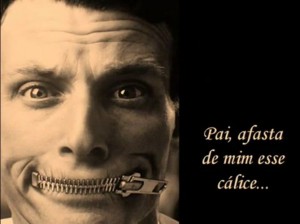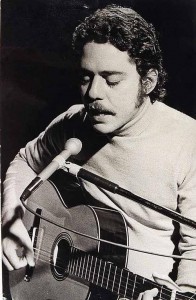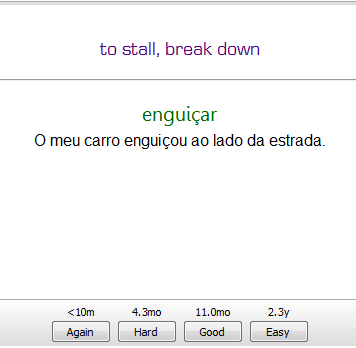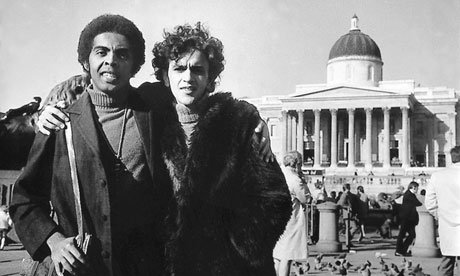This is the fourth in a series of posts on Tropicália and the Brazilian counterculture under the dictatorship, based on my study with Dr. Talia Guzman-Gonzalez at the University of Maryland, who has kindly helped me to edit my Portuguese writing.
 Chico Buarque é conhecido como o mestre lírico e a conciência moral da música brasileira nos anos 70. As letras dele são estudadas e analizadas por sua estrutura poética, duplo sentido, e jogo de palavras.
Chico Buarque é conhecido como o mestre lírico e a conciência moral da música brasileira nos anos 70. As letras dele são estudadas e analizadas por sua estrutura poética, duplo sentido, e jogo de palavras.
Antes de gravar as músicas mais marcantes da sua carreira, ele era amado pelos fãs da MPB. A maioria das músicas dele eram inspiradas pela bossa nova e samba. Venceu o Segundo Festival de Música Popular Brasileira com A Banda, uma bossa nova.
Mas ao longo dos anos 60, ele voltou a ser cada vez mais político nas composições. Eventualmente, ele chamou a atenção dos censores. Naquela época, era necessário que os artistas entregassem novos músicas, livros e filmes ao Departamento de Ordem Política e Social (DOPS) para obtenir permissão a lançá-los. Os censores exigiam frequentemente que ele retirasse ou substituisse várias frases ‘inaceitaveis’, como por exemplo em Partido Alto. Isso não dava para Buarque, e ele se encontrava obrigado a criar codenomes — Julinho da Adelaide e Leonel Paiva — para gravar sua música na forma em que ele quisesse. Um agente da ditadura descobriu a artimanha e começou a requer que as artistas entregassem documentos de identificação (Penedo do Amaral 2012). Buarque foi interrogado várias vezes.
 In 1968, como nós já discutimos, a situação no Brasil piorou com o decreto de AI-5. Em 1969, Emílio Médici assumiu a presidência e isso deu início ao período mais difíceis para as artistas (1969-1974). Enquanto Caetano Veloso e Gilberto Gil passaram seu exílio em Londres, Chico Buarque se exilou na Itália, onde tinha passado uns anos com a família quando era criança (o pai era o grande historiador Sérgio Buarque de Holanda). Ele passou o ano de 1970 lá, e voltou para o Brasil em 1971. Ao voltar, ele experimentou uma abordagem mais criativa: ao inves de usar codenomes, ele compôria músicas de duplo sentido — inocente na superfície, mas com crítica aguda por baixo. Disfarçada assim, a mensagem de protesto escaparia o olho do censor.
In 1968, como nós já discutimos, a situação no Brasil piorou com o decreto de AI-5. Em 1969, Emílio Médici assumiu a presidência e isso deu início ao período mais difíceis para as artistas (1969-1974). Enquanto Caetano Veloso e Gilberto Gil passaram seu exílio em Londres, Chico Buarque se exilou na Itália, onde tinha passado uns anos com a família quando era criança (o pai era o grande historiador Sérgio Buarque de Holanda). Ele passou o ano de 1970 lá, e voltou para o Brasil em 1971. Ao voltar, ele experimentou uma abordagem mais criativa: ao inves de usar codenomes, ele compôria músicas de duplo sentido — inocente na superfície, mas com crítica aguda por baixo. Disfarçada assim, a mensagem de protesto escaparia o olho do censor.
Apesar de Você
Apesar de Você é assim. À primeira vista, parece uma simples samba-canção sobre um amor caido aos pedaços. De fato, foi inicialmente aprovada pelos censores e distribuida às lojas. Mas uma matéria num jornal sugeriu que o você na letra podia ser uma referência ao Presidente Médici. DOPS trouxe Buarque para o escritório para exigir que ele explicasse o sentido da música. Logo depois o álbum foi censurado. Daí, Chico teve muitas músicas dele rejeitadas. Uma foi Calabar, que simbolizou a ditadura por meio dos colonizadores hollandeses.
Hoje você é quem manda
Falou, tá falado
Não tem discussão
A minha gente hoje anda
Falando de lado
E olhando pro chão, viu
Você que inventou esse estado
E inventou de inventar
Toda a escuridão
Você que inventou o pecado
Esqueceu-se de inventar
O perdão
Apesar de você
Amanhã há de ser
Outro dia
Eu pergunto a você
Onde vai se esconder
Da enorme euforia
Como vai proibir
Quando o galo insistir
Em cantar
Água nova brotando
E a gente se amando
Sem parar
Quando chegar o momento
Esse meu sofrimento
Vou cobrar com juros, juro
Todo esse amor reprimido
Esse grito contido
Este samba no escuro
Você que inventou a tristeza
Ora, tenha a fineza
De desinventar
Você vai pagar e é dobrado
Cada lágrima rolada
Nesse meu penar
Apesar de você
Amanhã há de ser
Outro dia
Inda pago pra ver
O jardim florescer
Qual você não queria
Você vai se amargar
Vendo o dia raiar
Sem lhe pedir licença
E eu vou morrer de rir
Que esse dia há de vir
Antes do que você pensa
Apesar de você
Amanhã há de ser
Outro dia
Você vai ter que ver
A manhã renascer
E esbanjar poesia
Como vai se explicar
Vendo o céu clarear
De repente, impunemente
Como vai abafar
Nosso coro a cantar
Na sua frente
Apesar de você
Amanhã há de ser
Outro dia
Você vai se dar mal
Etc. e tal
Também em 1971, Buarque gravou o álbum Construção. Este álbum contem algumas das suas músicas mais políticas e críticas da ditadura: Cotidiano, Construção, Samba de Orly, e Deus lhe Pague. Nessas, ele empregou duplo sentido e jogo de palavras para evadir o olho dos censores.
Ambos Cotidiano and Construção tratam das brutalidades diárias da vida urbana sob a ditadura. A industrialização rápido do chamado Milagre Brasileiro enriqueceu os já ricos, mas trouxe pouco para os trabalhadores que vieram em bando para as cidades grandes para trabalhar nas fábricas e construções de concreto. Para eles, o progresso era esmagador.
Cotidiano
Todo dia ela faz tudo sempre igual:
Me sacode às seis horas da manhã,
Me sorri um sorriso pontual
E me beija com a boca de hortelã.
Todo dia ela diz que é pr’eu me cuidar
E essas coisas que diz toda mulher.
Diz que está me esperando pr’o jantar
E me beija com a boca de café.
Todo dia eu só penso em poder parar;
Meio-dia eu só penso em dizer não,
Depois penso na vida pra levar
E me calo com a boca de feijão.
Seis da tarde, como era de se esperar,
Ela pega e me espera no portão
Diz que está muito louca pra beijar
E me beija com a boca de paixão.
Toda noite ela diz pr’eu não me afastar;
Meia-noite ela jura eterno amor
E me aperta pr’eu quase sufocar
E me morde com a boca de pavor.
Cotidiano se trata de temas de submissão à opressão, a monotonia da vida diária, e a falta de agentividade (impotência). Nessa música vimos como a falta de poder pode esmagar a vontade de resistir, até que as pessoas se acostumem com a impotência. Assim, a submissão à autoridade pode se tornar um hábito.
Mais uma vez, Buarque encaixa a ditadura na forma de uma mulher, neste caso a esposa do narrador. Ao longo da música, que se move da manhá até a noite, ela o decepciona com cordialidades e confissões de amor banais que soam falsas por serem repetidas do mesmo maneira dia após dia. Estas me lembram dos palavrãos de ordem e propagandas divulgados pelos governos militares ao longo do século vinte — uma forma de “Fique calma e siga em frente!“.
A rotina do casal é refletida na estrutura das estrofes, que têm todas a mesma forma. A música, por sua vez, consiste de uma série de acordes em queda que repete, estrofe a estrofe, sem o alívio de um refrão ou ponte. A única interrupção nesse padrão é o momento de suspensão nos fins dos estrophes, em que o ritmo muda e o tempo parece a ser pendurado, suspenso, com a esperança de algum novidade que nunca vem, só a próxima estrofe. Quando Buarque atinge o fim da letra, ele volta ao início e o ciclo se repete de novo, até que a música desvanece. Não tem início ou fim, nem fuga dessa rotina.
Na superfície, a casal tem um relacionamento tradicional — o homem trabalha fora da casa, a mulher o espera em casa. Mas por baixo não tem nenhuma paixão, sentimento sincero, ou novidade, só atos mecânicos. Sorrir. Beijar. Despedir da manhã. Cumprimentar à noite. Na vida deles, tudo é pré-determinado; nenhum dos dois tem agentividade ou controle sobre a vida. Também não há espaço para individualidade ou personalidade. Eles estão presos numa rotina interminável. Dessa forma, Buarque exprime o sentimento de impotência da vida sob a ditadura.
Isso se vê até na gramática dos versos. O homem é sempre o objeto passivo das ações do mulher. Ela me sacode, me beija, me espera, me aperta, me morde. Finalmente, na terça estrofe, vemos uma centelha de espera — ele começa a exercitar sua agentividade e se torna sujeito dos próprios ações: Todo dia eu só penso em poder parar / meio-dia eu só penso em dizer não / depois penso na vida de levar. Pela primeira vez, ele considera a possibilidade do seu próprio poder. Pensa no futuro. Mas logo ele apaga estes pensamentos perigosos, seja de um sentimento de desespero ou de pavor. É mais fácil simplesmente voltar ao presente (me cale com boca de feijão) e continuar a sobreviver. Isso é um retrato fascinante do jeito em que as ditaduras exercita controle sobre os cidadãos.
Cálice
Pai! Afasta de mim esse cálice
Pai! Afasta de mim esse cálice
Pai! Afasta de mim esse cálice
De vinho tinto de sangue
Father! Take this cup away from me
Father! Take this cup away from me
Father! Take this cup away from me!
This cup of blood red wine
Como beber dessa bebida amarga
Tragar a dor e engolir a labuta?
Mesmo calada a boca resta o peito
Silêncio na cidade não se escuta
De que me vale ser filho da santa?
Melhor seria ser filho da outra
Outra realidade menos morta
Tanta mentira, tanta força bruta
How can I drink this bitter drink
Drown the pain and swallow the toil?
Even shut, my mouth rests on my chest
Silence in the city cannot be heard
What is it worth to be the child of a saint?
Better to be the child of some other
Some other reality less dead
So many lies, so much brute force
Como é difícil acordar calado
Se na calada da noite eu me dano
Quero lançar um grito desumano
Que é uma maneira de ser escutado
Esse silêncio todo me atordoa
Atordoado eu permaneço atento
Na arquibancada, prá a qualquer momento
Ver emergir o monstro da lagoa
How difficult it is to wake up silenced
If in the silence of the night I hurt myself
I want to give an inhuman scream
Which is one way to make yourself heard
This silence stuns me
Stunned, I remain alert
In the bleachers, expecting at any moment
To see the lagoon monster emerge
De muito gorda a porca já não anda (Cálice!)
De muito usada a faca já não corta
Como é difícil, Pai, abrir a porta (Cálice!)
Essa palavra presa na garganta
Esse pileque homérico no mundo
De que adianta ter boa vontade?
Mesmo calado o peito resta a cuca
Dos bêbados do centro da cidade
The pig is so fat it no longer walks (Shut up!)
The knife is so used it no longer cuts
How difficult it is, Father, to open the door (Shut up!)
This word caught in my throat
This Homeric liquor (?) in the world
Which ? to have good will
Even shut up my mouth rests on the cuckoo
Of the drunks downtown
Talvez o mundo não seja pequeno (Cale-se!)
Nem seja a vida um fato consumado (Cale-se!)
Quero inventar o meu próprio pecado (Cale-se!)
Quero morrer do meu próprio veneno (Pai! Cale-se!)
Quero perder de vez tua cabeça! (Cale-se!)
Minha cabeça perder teu juízo. (Cale-se!)
Quero cheirar fumaça de óleo diesel (Cale-se!)
Me embriagar até que alguém me esqueça (Cale-se!)
Perhaps the world isn’t so small (Shut up!)
Nor is life a consumed fact (Shut up!)
I want to invent my own sin (Shut up!)
I want to die of my own venom (Shut up!)
I want to lose your head (Shut up!)
My head to lose your judgement (Shut up!)
I want to smell diesel fumes (Shut up!)
To get drunk until someone forgets me (Shut up!)
O exemplo mais famoso do duplo sentido na obra do Buarque, “Cálice” é uma poderosa canção de protesto, e também a música dele que trata de forma o mais direita do tópico de censura. Embora ele a gravasse com Milton Nascimento, foram Buarque e Gilberto Gil que escreveu a letra e música. Abre com um cântico de igreja a capella, estabelecendo um contexo religioso para a letra que segue. A linguagem religiosa é com certeza uma capa que esconde o sentido político, mas será que ela também seja uma crítica da igreja católica que era cúmplice às brutalidades da ditadura? (em grande parte — claro que tinham padres na esquerda bem como na direita, mas como uma instituição mundial, a igreja era cúmplice por causa do seu silêncio).
Buarque e Nascimento se revezam ao cantar cada estrofe. O refrão é cheio de imagens cristãs, mas as estrofes trazem com seu tema a dor de ser silenciado, a necessidade de ser escutado, e o tratamento violento de quem se manifestar contra o estado. Tem muitos símbolos da voz como objeto corporal: uma boca calada, os atos de beber e engolir, palavras presas na garganta.
Cálice, claro, pode significar uma taça para vinho, ou a órdem Cale-se! Os gritos do Chico funciona como contraponto às estrofes, a voz dos censores. A apresentação de Cálice por Buarque e Nascimento em 1973 no show televisado Phono foi uma das apresentações mais memoráveis da época da ditadura. Proibidos de cantar a letra “subversiva”, eles cantarolam a melodia, se tornando cada vez mais corajosos. Enfim Chico grita “Cale-se!” várias vezes em sucessão, até que alguém desligue o microfone. Ele o tamborila com o dedo. “Tem som?” pergunta à plateia. Tem algo profundo nesse censura de uma música sobre a censura.
A linha Quero inventar meu próprio pecado se trata da linha da Apesar de Você em que Buarque canta Você que inventou pecado.
As linhas Quero morrer do meu próprio veneno e Quero cheirar fumaça de óleo diesel se referem a Stuart Angel Jones, um militante do grupo revolucionário MR-8. Ele foi preso pela polícia militar e torturado com boca colada para a válvula de escape de um veículo. Assim, a polícia o envenenou com as fumaças e o matou. Essa tórtura representa a censura na sua forma mais violento e final.
Devido ao conteudo subversivo, DOPS não deu permissão para Buarque e Nascimento gravarem Cálice até 1978.
Construção
Amou daquela vez como se fosse a última
Beijou sua mulher como se fosse a última
E cada filho seu como se fosse o único
E atravessou a rua com seu passo tímido
Subiu a construção como se fosse máquina
Ergueu no patamar quatro paredes sólidas
Tijolo com tijolo num desenho mágico
Seus olhos embotados de cimento e lágrima
Sentou pra descansar como se fosse sábado
Comeu feijão com arroz como se fosse um príncipe
Bebeu e soluçou como se fosse um náufrago
Dançou e gargalhou como se ouvisse música
E tropeçou no céu como se fosse um bêbado
E flutuou no ar como se fosse um pássaro
E se acabou no chão feito um pacote flácido
Agonizou no meio do passeio público
Morreu na contramão atrapalhando o tráfego
Amou daquela vez como se fosse o último
Beijou sua mulher como se fosse a única
E cada filho seu como se fosse o pródigo
E atravessou a rua com seu passo bêbado
Subiu a construção como se fosse sólido
Ergueu no patamar quatro paredes mágicas
Tijolo com tijolo num desenho lógico
Seus olhos embotados de cimento e tráfego
Sentou pra descansar como se fosse um príncipe
Comeu feijão com arroz como se fosse o máximo
Bebeu e soluçou como se fosse máquina
Dançou e gargalhou como se fosse o próximo
E tropeçou no céu como se ouvisse música
E flutuou no ar como se fosse sábado
E se acabou no chão feito um pacote tímido
Agonizou no meio do passeio náufrago
Morreu na contramão atrapalhando o público
Amou daquela vez como se fosse máquina
Beijou sua mulher como se fosse lógico
Ergueu no patamar quatro paredes flácidas
Sentou pra descansar como se fosse um pássaro
E flutuou no ar como se fosse um príncipe
E se acabou no chão feito um pacote bêbado
Morreu na contra-mão atrapalhando o sábado
Em Construção, vemos mais uma vez um homem comum, da classe operária, levando uma vida sem esperança ou agentividade. Este homem trabalha numa daquelas altas construções de concreto que foram construidas por todo o Brasil nos anos 70s.
Até mais do que em Cotidiano, vemos estrofes em que a repetição é o principal elemento organizador. Cada linha começa com um verbo no preterito; assim a vida dele é narrada através uma série de ações. Cada linha termina com uma palavra proparoxítona, criando uma poesia rítmica. No fim de cada estrofe, o tempo aumenta e a repetição mais intensa.
Quando ele cai da construção, batendo no chão com violência, o único efeito é a atrapalhação de trânsito; é uma morte sem sentido, pelo menos na media em que a sociedade se importa.
No segundo e terceiro versos acontece algo interessante. A última palavra de cada linha é substituida por uma de outra estrofe, e assim a letra fica atrapalhada. As substituições se tornam cada vez mais surrealistas. O absurdo dos versos destaca o absurdo da morte do homem numa sociedade em que a morte é coisa cotidiano.
* Foram recentemente descobridos milhares de documentos que o DOPS manteu durante a ditadura, pertencendo às investigações de 45 mil pessoas, incluindo o ex-presidente Lula e Ché Guevara. Será que tem documentos sobre Chico também?


 Hurray for a new version (2.0) of
Hurray for a new version (2.0) of 



